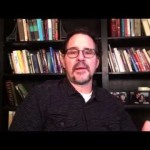We run our website the way we wished the whole internet worked: we provide high quality original content with no ads. We are funded solely by your direct support. Please consider supporting this project.
How can we determine what is and is not “open” about the future?
Question: You believe that the future is partly open. You’re writing has pretty much convinced me this is true, but I’ve still got some serious questions about it. For example, how does anyone determine what part is open and what part is not? If we can’t determine what is and is not open, isn’t the concept of an open future really an empty concept? And if we can’t know the extent to which the future is open or not, how do we ever hold ourselves or anyone else morally responsible for their actions?
Answer: I’ll make four brief comments in response.
1) We can be confident that the future is settled to the extent that the Bible depicts the future as being settled. This, of course, assumes you’re confident that a) the Bible is divinely inspired and b) that your interpretation of the Bible is accurate. Also, to the extent that we can be confident God isn’t going to fundamentally alter the laws of physics, we can assume that all aspects of the future directly entailed by these laws are closed. In other words, to the extent that science can accurately predict the future, the future is settled.
Conversely, to the extent that the Bible depicts the future as open, we can be confident the future is open. Also, to the extent that we deliberate about decisions, weighing the different possibilities before us, we may assume the future is genuinely open. Indeed, we need to presuppose it’s open in order to deliberate about it (which is why I argue that everybody presupposes [and thus unconsciously believes] the open view of the future is true, despite the fact that they may sincerely think it’s false!).
Beyond this, I honestly don’t think we can know what is and is not settled about the future. In fact, though we have to presuppose the future is open whenever we deliberate about various courses of actions we might take, we really can’t know the extent to which our own future is truly open. We don’t know the extent to which our thoughts and actions at any given moment are genetically and environmentally determined. Nor do we know the extent to which our deliberation processes have been formed by habits we’ve cultivated over time. And if we can’t even know this about ourselves, how much less can we know this about anyone else?
2) Our inability to confidently determine much about the future in terms of what is and is not open doesn’t mean the concept of an open future is empty, any more than it implies that the concept of a partly closed future is empty. In fact, if you think about it, this way of reasoning would eventually lead to the conclusion that all concepts about which one isn’t omniscient are meaningless – which of course is absurd.
3) While we can’t ordinarily know in any concrete way the extent to which our future (or anyone’s future) is open, this doesn’t negate the important principle that the future is open to the extent that a person is morally responsible for the way they resolve possibilities. In other words, we are morally responsible for our actions insofar as we could have done otherwise.
Now, it may be the case that at the time a person performed an action they couldn’t have done otherwise due to the way their character had been solidified. Yet, as Aristotle understood so clearly 2400 years ago (as described in Nicomedian Ethics), this person may still be responsible for their action if they themselves were responsible for developing their character the way they did. In other words, the fact that a person can’t now do otherwise regarding a particular course of action doesn’t excuse them if they once could have done otherwise. The guy who now can’t help but to spend his kid’s milk money to get high on meth is still responsible for his actions, because he made the morally responsible choice go down a path that led him to this pathetic bondage.
4) As a principle, we can know that a person is morally responsible for that about which they could have done otherwise, as I just said. But if we remember that we can’t even know the extent to which our own future is open, this means we can’t know the extent to which any person is actually morally responsible for what they do. But why should this bother us? We’re not to judge anyone – precisely because God alone knows the extent to which they are responsible for what they do (I Sam. 16:7). Paul said he didn’t even judge himself, and I’m convinced this is why (I Cor. 4.3).
Now, of course society needs to judge people for legal purposes, and so it is a jury’s duty to decide the extent to which a person could have avoided doing what they did. But as believers, we’re to know that we can never judge.
I find it helpful to cultivate the following mindset. While I don’t judge myself, I assume that my future is maximally open while assuming that other people’s futures are maximally closed. That is, if I am deliberating about several options, I assume that these options are genuinely possible and that my future, at least in regards to these decisions, is open. But with regard to other people’s actions, I assume that, however things appear, they couldn’t have done otherwise (unless, of course, I’m serving on a jury where I have to guess differently). (See the Essay, Living Jesus’ Prayer for Forgiveness).
Here’s my rational for this assumption: with regards to my own actions, I have to act on the assumption that I’m free to make genuine decisions. As I said earlier, there’s no other way to deliberate except by presupposing your decision is genuinely open and up to you to resolve. And in regards to other people’s actions, I’m forbidden to judge them anyways, so what good does it do to assume they’re responsible? I find that living in this reality empowers me to take total responsibility for my life, on the one hand, while freeing me from my fallen addiction to judgment, on the other.
Let us take responsibility for our lives, relinquish responsibility for judging others, and humbly acknowledge our massive ignorance at all times.
Category: Q&A
Tags: Open Theism, Q&A
Topics: Free Will and the Future
Related Reading

Why the 35W Bridge Collapsed – blog post 8/09/2007
As all of you know, I’m sure, a little over a week ago the 35W bridge in Minneapolis collapsed. This is the most traveled bridge in Minnesota. It was a tragedy, though the fact that only 13 people died and/or are presumed dead is really amazing, especially given that this happened at the peak of…

Free Will in the Bible
Scripture portrays humans as having minds and wills of their own. They are, in a real (though limited) sense, creators of their own behavior and determiners of their own destinies—whether this behavior and destiny is in line with God’s will or not. This fundamental assumption is demonstrated in a variety of ways throughout Scripture. It…

My Car Crash and the Open View
Last Saturday night Shelley and I were involved in a rather serious four car crash on a local highway. One person was hospitalized, and I’m being treated for neck pain and an on-going dull headache. But thankfully, no one was critically injured. In any event, the crash inspired several folks to e-mail or tweet questions…

Why have you consistently stressed the need for the Western Church to learn from the African Church?
Question: I’ve heard you argue that the white Western church has a lot to learn theologically from African cultures. What is it specifically that you’re referring to? Response: I do strongly believe that the western church needs to humbly sit at the feet of our fellow Christians in Africa. My conviction is based on four…

How do you respond to Malachi 3:6?
“For I the Lord do not change; therefore you, O children of Jacob, have not perished.” Some cite this verse as evidence that God need never be flexible in his plans and change his mind. But this claim contradicts all the explicit declarations in Scripture which state that God does frequently modify his plans and…

Hearing and Responding to God: Part 1
A reader contacted Greg asking about making “right decisions” assuming an open future and in light of the fact that God seems to rarely speak clearly. In this first response, Greg acknowledges that even with the best of intentions, our decisions can have outcomes that are unexpected even to God! How can we move forward…
